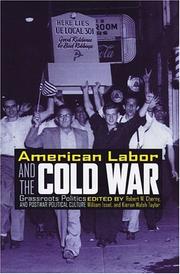| Listing 1 - 2 of 2 |
Sort by
|
Book
ISBN: 0691135630 9786612531576 1400834686 1282531573 9781400834686 9780691135632 9780691135632 9781282531574 Year: 2010 Publisher: Princeton, NJ : Princeton University Press,
Abstract | Keywords | Export | Availability | Bookmark
 Loading...
Loading...Choose an application
- Reference Manager
- EndNote
- RefWorks (Direct export to RefWorks)
Americans like to think that they look after their own, especially in times of hardship. Particularly for the Great Depression and the Great Society eras, the collective memory is one of solidarity and compassion for the less fortunate. Who Cares? challenges this story by examining opinion polls and letters to presidents from average citizens. This evidence, some of it little known, reveals a much darker, more impatient attitude toward the poor, the unemployed, and the dispossessed during the 1930's and 1960's. Katherine Newman and Elisabeth Jacobs show that some of the social policies that Americans take for granted today suffered from declining public support just a few years after their inception. Yet Americans have been equally unenthusiastic about efforts to dismantle social programs once they are well established. Again contrary to popular belief, conservative Republicans had little public support in the 1980's and 1990's for their efforts to unravel the progressive heritage of the New Deal and the Great Society. Whether creating or rolling back such programs, leaders like Roosevelt, Johnson, Nixon, and Reagan often found themselves working against public opposition, and they left lasting legacies only by persevering despite it. Timely and surprising, Who Cares? demonstrates not that Americans are callous but that they are frequently ambivalent about public support for the poor. It also suggests that presidential leadership requires bold action, regardless of opinion polls.
United States -- Economic policy -- 20th century. --- United States - Economic policy - 20th century. --- United States -- Politics and government -- 1933-1945. --- United States - Politics and government - 1933-1945. --- United States -- Politics and government -- 1945-1989. --- United States - Politics and government - 1945-1989. --- Economic History --- Business & Economics --- Economics --- United States --- Economic policy --- Politics and government --- Economic theory --- Political economy --- Social sciences --- Economic man --- POLITICAL SCIENCE / Public Policy / Social Services & Welfare.


ISBN: 081353402X 0813537134 9786613839213 0813555051 128352676X 9780813537139 9780813534022 0813534038 9780813534039 9780813555058 9781283526760 6613839213 Year: 2004 Publisher: New Brunswick, NJ : Rutgers University Press,
Abstract | Keywords | Export | Availability | Bookmark
 Loading...
Loading...Choose an application
- Reference Manager
- EndNote
- RefWorks (Direct export to RefWorks)
The American labor movement seemed poised on the threshold of unparalleled success at the beginning of the post-World War II era. Fourteen million strong in 1946, unions represented thirty five percent of non-agricultural workers. Why then did the gains made between the 1930's and the end of the war produce so few results by the 1960's? This collection addresses the history of labor in the postwar years by exploring the impact of the global contest between the United States and the Soviet Union on American workers and labor unions. The essays focus on the actual behavior of Americans in their diverse workplaces and communities during the Cold War. Where previous scholarship on labor and the Cold War has overemphasized the importance of the Communist Party, the automobile industry, and Hollywood, this book focuses on politically moderate, conservative workers and union leaders, the medium-sized cities that housed the majority of the population, and the Roman Catholic Church. These are all original essays that draw upon extensive archival research and some upon oral history sources.
Anti-communist movements -- United States -- History. --- Cold War. Political culture -- United States -- History -- 20th century. --- Labor unions -- Political activity -- United States -- History -- 20th century. --- United States -- Politics and government -- 1945-1953. --- United States -- Politics and government -- 1953-1961. --- Labor unions --- Anti-communist movements --- Cold War --- Political culture --- Business & Economics --- Labor & Workers' Economics --- History --- Political activity --- Industrial unions --- Labor, Organized --- Labor organizations --- Organized labor --- Trade-unions --- Unions, Labor --- Unions, Trade --- Working-men's associations --- Culture --- Political science --- World politics --- Labor movement --- Societies --- Central labor councils --- Guilds --- Syndicalism --- United States --- Politics and government --- E-books
| Listing 1 - 2 of 2 |
Sort by
|

 Search
Search Feedback
Feedback About
About Help
Help News
News